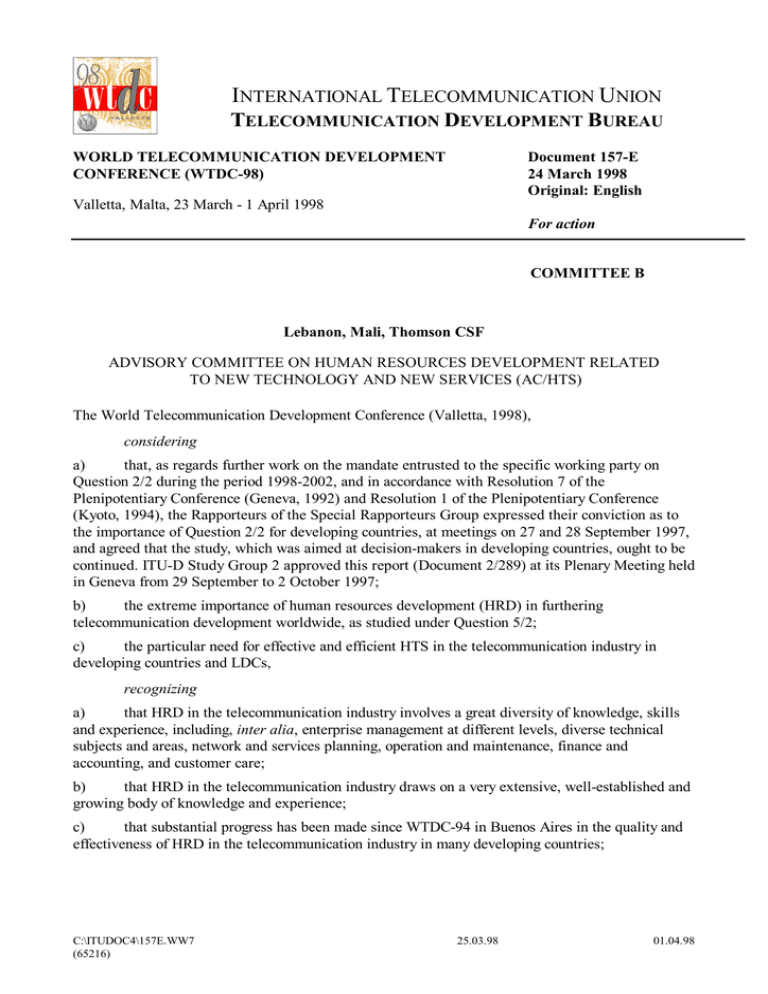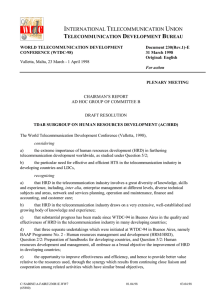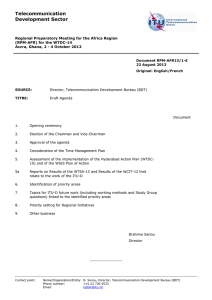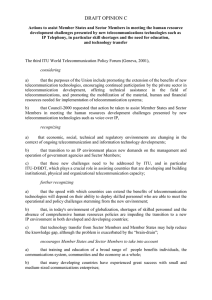I T U D
advertisement

I NTERNATIONAL TELECOMMUNICATION UNION TELECOMMUNICATION DEVELOPMENT BUREAU Document 157-E 24 March 1998 Original: English WORLD TELECOMMUNICATION DEVELOPMENT CONFERENCE (WTDC-98) Valletta, Malta, 23 March - 1 April 1998 For action COMMITTEE B Lebanon, Mali, Thomson CSF ADVISORY COMMITTEE ON HUMAN RESOURCES DEVELOPMENT RELATED TO NEW TECHNOLOGY AND NEW SERVICES (AC/HTS) The World Telecommunication Development Conference (Valletta, 1998), considering a) that, as regards further work on the mandate entrusted to the specific working party on Question 2/2 during the period 1998-2002, and in accordance with Resolution 7 of the Plenipotentiary Conference (Geneva, 1992) and Resolution 1 of the Plenipotentiary Conference (Kyoto, 1994), the Rapporteurs of the Special Rapporteurs Group expressed their conviction as to the importance of Question 2/2 for developing countries, at meetings on 27 and 28 September 1997, and agreed that the study, which was aimed at decision-makers in developing countries, ought to be continued. ITU-D Study Group 2 approved this report (Document 2/289) at its Plenary Meeting held in Geneva from 29 September to 2 October 1997; b) the extreme importance of human resources development (HRD) in furthering telecommunication development worldwide, as studied under Question 5/2; c) the particular need for effective and efficient HTS in the telecommunication industry in developing countries and LDCs, recognizing a) that HRD in the telecommunication industry involves a great diversity of knowledge, skills and experience, including, inter alia, enterprise management at different levels, diverse technical subjects and areas, network and services planning, operation and maintenance, finance and accounting, and customer care; b) that HRD in the telecommunication industry draws on a very extensive, well-established and growing body of knowledge and experience; c) that substantial progress has been made since WTDC-94 in Buenos Aires in the quality and effectiveness of HRD in the telecommunication industry in many developing countries; C:\ITUDOC4\157E.WW7 (65216) 25.03.98 01.04.98 -2CMDT98/157-E d) that three separate undertakings which were initiated at WTDC-94 in Buenos Aires, namely BAAP Programme No. 2 - Human resources management and development (HRM/HRD), Question 2/2: Preparation of handbooks for developing countries, and Question 5/2: Human resources development and management, all embrace as a broad objective the improvement of HRD in developing countries; e) the opportunity to improve effectiveness and efficiency, and hence to provide better value relative to the resources used, through the synergy which results from continuing close liaison and cooperation among related activities which have similar broad objectives, taking into account a) that, in fulfilment of its mandate, the Special Rapporteurs Group for Question 2/2 drew up three handbooks: – New developments in rural telecommunications; – New technologies and new services; – Legal, economic and structural aspects for the introduction of a national radio-frequency spectrum management and monitoring system. The Special Rapporteurs Group prepared its handbooks in the light of the objectives set by WTDC-94 and took into account the future applications of new telecommunication technologies and services in developing countries. The handbooks are thus made up of three separate parts: 1) the main body of the text, which is general; 2) annexes listing the new technologies and new services which are being introduced on world and domestic markets and are to be analysed during the period 1998-2002; 3) case studies planned or under way. As these projects are implemented, it will be possible to produce guidelines for the benefit of developing countries which are planning to introduce new technologies and new services into their national and regional networks; b) the current ITU-D "Centres of Excellence initiative", which seeks to provide significant focus and impetus for telecommunication HRD through expertise and leadership developed and provided by world-class Centres of Excellence; c) the possibility of increasing the effectiveness and efficiency of the Centres of Excellence through collegial relationships which develop and share knowledge and experience in curricula, course design, teaching methods and other aspects of pedagogy, noting a) the unique and valuable opportunity to simultaneously use and demonstrate the techniques and technology of our own industry, which have already been embraced by BDT, to provide effective and efficient HRD through "virtual training centres" which make use of "distance learning" techniques, taking advantage of the application of appropriate information and communication technology (ICT); b) both the need and the opportunity to establish a visible, effective leadership role through the ITU-D-supported Centres of Excellence in their respective regions, C:\ITUDOC4\157E.WW7 (65216) 25.03.98 01.04.98 -3CMDT98/157-E convinced of the substantial value of encouraging and promoting effective interaction among skilled and experienced HRD managers from both developing and developed countries with a view to exchanging knowledge and experience, agreeing on "best practice" approaches, and sharing training and educational material, including handbooks and guidebooks, resolves to establish, during the period 1998-2002, an Advisory Committee which will provide guidance and advice in the field of human resources development, new technologies and new services, and which will operate in accordance with the Terms of Reference which appear in Annex A. C:\ITUDOC4\157E.WW7 (65216) 25.03.98 01.04.98 -4CMDT98/157-E ANNEX A Terms of Reference of the Advisory Committee on Human Resources Development 1 The Advisory Committee on Human Resources Development (AC/HTS) as related to new technologies and new services, shall be responsible to and report to the TDAB, or its successor organization, through its Chairman, who shall be a member of TDAB. The Chairman of the AC/HTS shall be appointed by the World Telecommunication Development Conference. 2 The AC/HTS shall be empowered to select and invite members to join in its work as it considers most appropriate, based on the prospective members' knowledge and contribution to HTS, with particular focus on the developing countries. 3 The AC/HTS shall be an "open" group, welcoming all who wish to join it and participate in its work. 4 The AC/HTS shall collect, assess and prioritize all identified HRD needs, including the preparation of handbooks. It shall provide advice on appropriate actions to best meet these needs, in accordance with priorities, in the most orderly and efficient way. Due consideration shall be given to regional requirements and relationships. The Committee shall continue the work already started in the study groups under Questions 2/2 and 5/2 with a view to conducting surveys and studies (including the preparation of handbooks) on practical aspects of specific telecommunication development planning applications (new technologies, new services, spectrum management and monitoring, economic aspects, human resources) in different countries and bringing the results of these studies to the notice of national decision-makers and policy-makers. Those responsible for network planning should have the necessary information and tools to evaluate long-term national needs and to help solve the problems of harmonized development at the national and global levels. 5 The Committee shall carry out its work through periodic meetings, which may be held at a single location or via electronic means (teleconference). In the periods between meetings, the Committee's work shall be furthered by electronic means. For a meeting which is held at a single location, the Committee is encouraged to consider holding the meeting at a training location in a developing country. 6 The Committee shall carry out a specific supervisory role with respect to the ITU-sponsored Centres of Excellence in order to ensure that these Centres play a leadership role in their respective regions, effectively and efficiently delivering HTS services that are well matched to their clients' needs and wants, and that they provide a suitable role model for other training organizations. The following actions are recommended: 1) 2) Evaluation of the implementation of new technologies and new services in the world: – updating of the annexes to the ITU-D handbooks for the period 1998-2002; – preparation of guidelines and handbooks. Evaluation of conclusions of case studies in ITU-D handbooks for the period 1994-1998 and of pilot projects: – formulation of guidelines for developing countries, taking into account the regulatory, financial, technical, human resources and maintenance aspects. C:\ITUDOC4\157E.WW7 (65216) 25.03.98 01.04.98 -5CMDT98/157-E 3) Evaluation of different countries' experience in introducing the information and communication society (Internet, multimedia and GII in particular). 4) Preparation of a general report on different countries' experience with the establishment and operation of regulatory authorities, particularly in the context of globalization (case studies). 5) Handbooks for human resources management and development, covering all aspects of training and development, and more particularly computer and electronic techniques for an understanding of the introduction of information technologies in networks. ____________ C:\ITUDOC4\157E.WW7 (65216) 25.03.98 01.04.98



